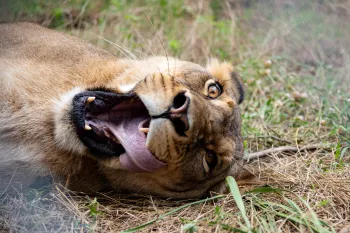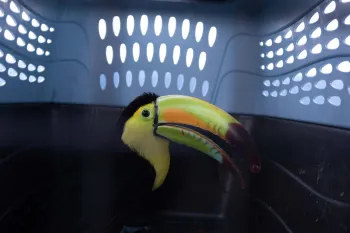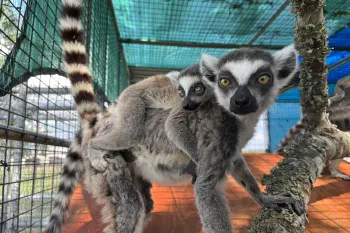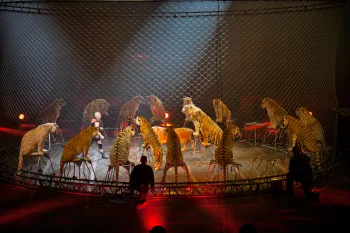During the time our caretakers at Black Beauty Ranch have gotten to know a lioness named Douala, we’ve learned a lot about her personality. Douala likes to begin each morning with a strong roar, which can seemingly be heard for miles. She spends much of her time in the cooler mornings and evenings high on her perch where she can observe her environment, and during midday she can be found in the shade of her lush forest. Of her enrichment activities, playing with donut-shaped toy is the favorite; she’s often seen carrying it around in her mouth. Come autumn, as she plays with the pumpkins the sanctuary provides, Douala’s inner kitten comes out.
Life has not always been this sweet for Douala. Just over five years ago, our teams rescued Douala along with more than 200 other wild animals from the St. Edouard Zoo, an unaccredited zoo in Quebec, Canada, which had a history of warnings and charges from the local government. This time, the operator of the zoo had been charged with two counts of criminal cruelty and neglect following an investigation by the Montreal SPCA, leading to the seizure of these animals and the closure of the zoo.
Humane Society International immediately assumed the care and placement of more than 200 wild and exotic animals. Rescuers found a kangaroo family in a tiny indoor pen huddled together with no sunlight. We found a zebra with painfully long hooves languishing in a small dark stall where he stood in urine and feces and chewed on the walls out of boredom and frustration. And a wildebeest trapped in the barn was so stressed he would charge the gate of his small enclosure.
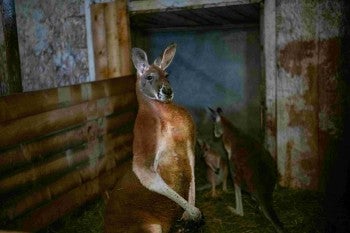
Meredith Lee/HSI
Even though Douala had it better than some of the other animals—at least she had an outdoor habitat—she had been spending her days pacing back and forth in her enclosure (a sign of stress) and digging along the fence, as if desperately trying to find a way out.
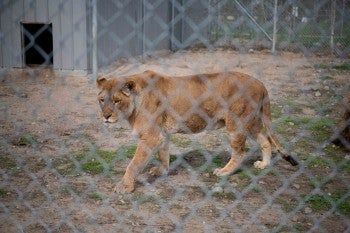
Meredith Lee/HSI
To meet the myriad needs of animals of many kinds, including big cats like Douala, zebras and kangaroos, among others, placement at sanctuaries and qualified facilities across North America was a monumental effort. One of the safe havens for some of the animals was our sprawling 1,400-acre sanctuary in Murchison, Texas.
The kangaroo family, zebra, wildebeest and others have been happily making Black Beauty Ranch their home, too. Where before the animals were kept in barren enclosures lacking enrichment, dungeon-like basements or decrepit barns encrusted with filth and feces and without access to sunlight or ventilation, they now enjoy fresh air and grassy fields at Black Beauty Ranch. Where before they did not have reliable access to proper food or water, they now enjoy nutritious meals tailored to their biological needs.
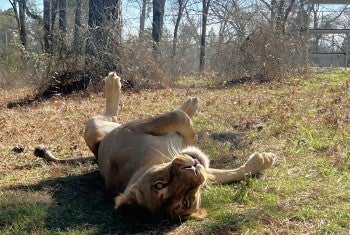
Christi Gilbreth/The HSUS
I remember seeing the first photos our team took of the conditions in which the animals had been living. Images like these always speak to a deeper and profoundly sad truth about the history of how we human beings have related to animals, shutting them away for the sake of human whimsy, keeping them hostage for our entertainment. This point of view treats animal life as worth only as much as it piques our curiosity, and as disposable when our attention turns elsewhere.
It is the nature of our work creating systemic change to end animal cruelty and better animal welfare that there is always more to be done, and so it can be difficult to remember to pause and reflect on our successes. I’m heartened that the story of these animals and their transformation is being shared. When I see pictures of Douala now, I’m reminded that with every animal we rescue and every law passed and enforced against animal cruelty, we’re taking another step toward creating the humane world at the center of our vision.
Follow Kitty Block @HSUSKittyBlock.
